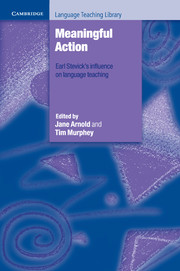Book contents
- Frontmatter
- Contents
- List of contributors
- Acknowledgements
- Preface
- Introduction
- Part A Meaning-making inside and between the people in the classroom
- Part B Meaningful classroom activity
- Part C Frameworks for meaningful language learning
- Epilogue: A way with words – perspectives on the contributions and influence of Earl W. Stevick
- Appendix: Words of tribute to Earl Stevick
- Index
8 - Memory and vocabulary acquisition
Published online by Cambridge University Press: 15 November 2023
- Frontmatter
- Contents
- List of contributors
- Acknowledgements
- Preface
- Introduction
- Part A Meaning-making inside and between the people in the classroom
- Part B Meaningful classroom activity
- Part C Frameworks for meaningful language learning
- Epilogue: A way with words – perspectives on the contributions and influence of Earl W. Stevick
- Appendix: Words of tribute to Earl Stevick
- Index
Summary
In the first part of Memory, Meaning and Method (1976), Earl Stevick discussed a number of research studies into the way memory works in general, relating particularly to verbal memory (pp. 11–32). Since the book was written, a substantial amount of further research has been carried out on various aspects of vocabulary learning and memorization. In this chapter I shall look at selected studies that relate to topics in this area that appear in Stevick's book, discuss briefly some of the theoretical and practical issues they raise, and suggest practical applications to classroom teaching and materials design.
The topics are:
1. Memory traces
2. Retrieval-based vocabulary review
3. Learning words within semantic sets
4. Massed and distributed learning
5. Depth of processing
Memory traces
In early research on animal memory, it was shown that rats seemed to have a vague memory of previous learning, which – if it was not too long ago – helped them relearn the same target behaviour later (Stevick 1976). This led to a generalized theory about ‘memory traces’: the idea that even if we cannot consciously recall a particular experience or piece of information, and think we have forgotten it, a ‘trace’ remains in our memory which can be activated later and facilitates learning when the original stimulus is re-encountered.
It is interesting that hypotheses about memory traces and gradual learning have influenced language acquisition research very little, perhaps because of their rather vague and unquantifiable nature. In a typical research study on vocabulary learning, a group of learners is asked to learn a particular set of items under experimental conditions and is then tested to find out how well they have learned the target material, as contrasted with a control group (e.g. Tinkham 1997 and Mondria 2003, both mentioned later in this chapter). Sometimes there are both immediate and delayed post-tests, but in any case the results are quantified in terms of what the learners can demonstrate that they know in terms of accurate recognition or recall. Normally, no attempt is made to find out whether partial learning (leaving ‘traces’) has taken place.
- Type
- Chapter
- Information
- Meaningful ActionEarl Stevick's Influence on Language Teaching, pp. 131 - 142Publisher: Cambridge University PressPrint publication year: 2013



